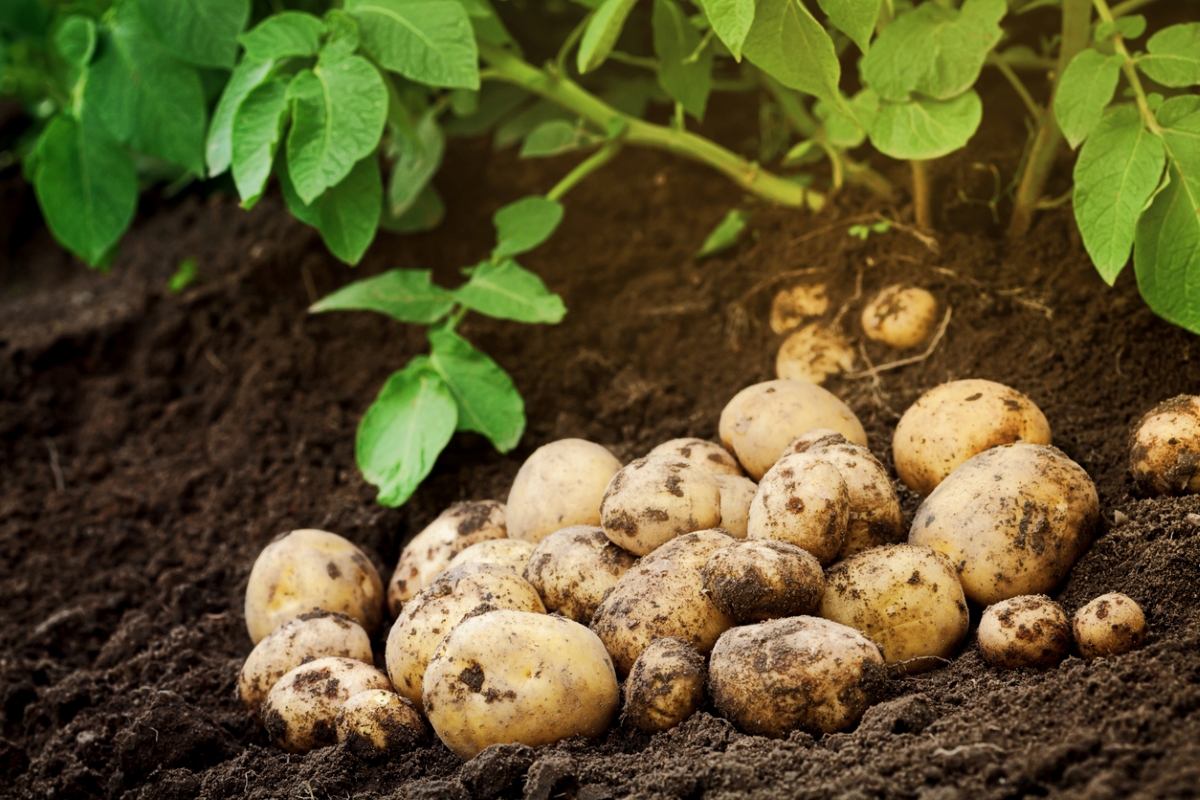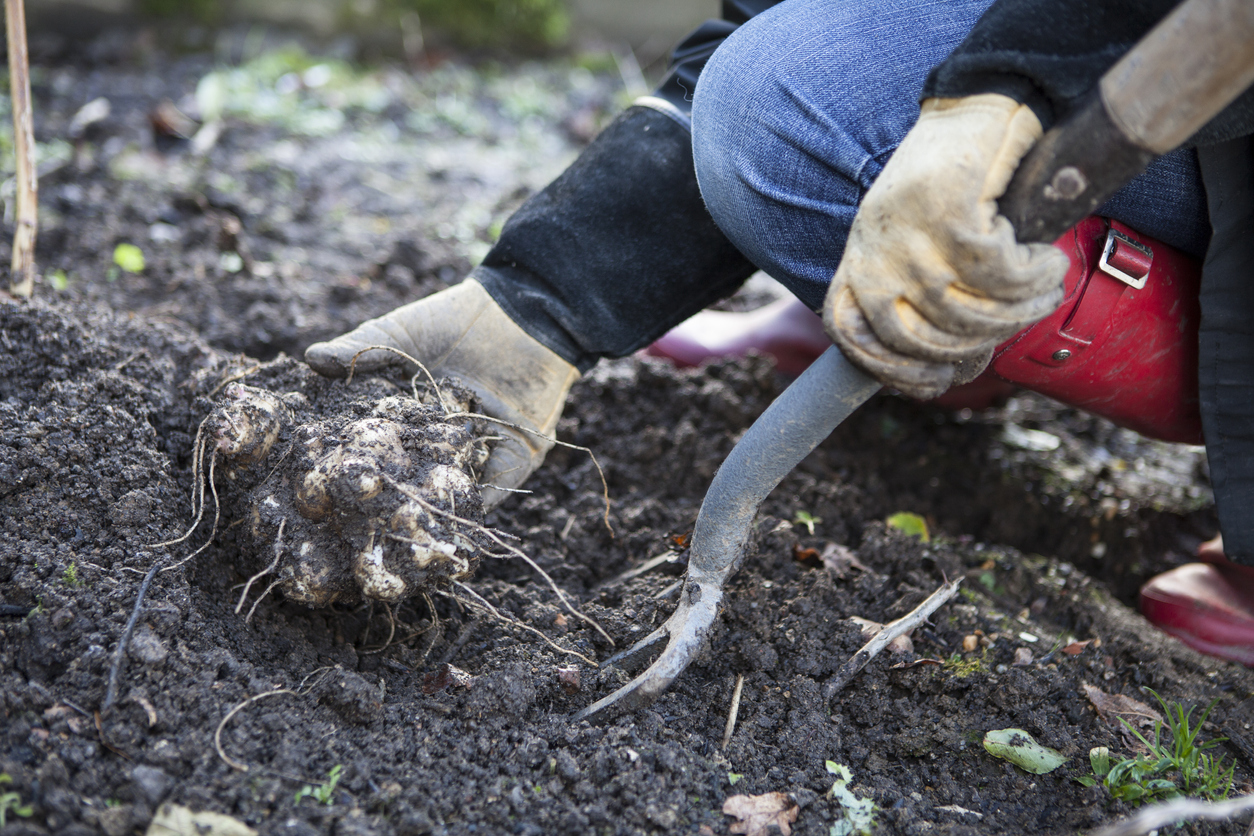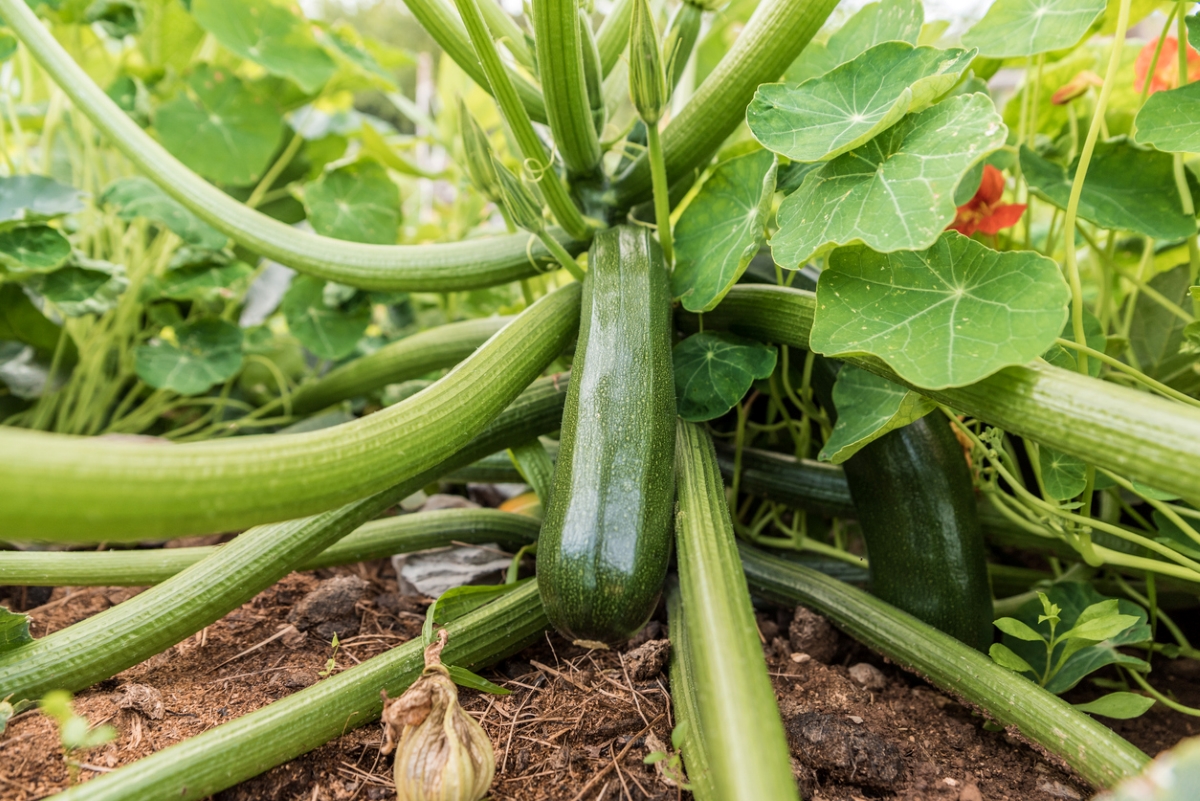

We may earn revenue from the products available on this page and participate in affiliate programs. Learn More ›
Like other types of squash, zucchini can attract pests like aphids, squash bugs, and vine borers, which discolor plant leaves, damage developing fruit, and sometimes even cause entire vines to collapse. However, pests aren’t the only problems gardeners have to contend with when growing zucchinis. In the absence of pollinators, zucchini plants can produce flowers but no fruit, and in poor or weedy soils, zucchinis can become stunted and not produce well.
But while the causes of zucchini growing woes are varied, many of these issues can be improved with companion planting for zucchini. “Diversity in a garden is almost always a good thing,” notes Caleb Goossen, an organic crop and conservation specialist at the Maine Organic Gardeners and Farmers Association.
“Simply having a diversity of flowering plants that collectively bloom throughout the season” supports beneficial insects and helps “keep pest insect populations in check,” says Goossen, who emphasizes that there are also some “real space saving benefits to interplanting crops that occupy different amounts and sections of both soil and above ground space!”
Whether it’s pests or dreams of a more prolific garden that’s inspired you to explore zucchini companion planting, this guide is here to help. You’ll discover what grows well with zucchini and find the top tips for companion planting courgettes or zucchini for natural pest control, healthier soil, and more.
Plants That Deter Pests and Disease, Attract Beneficial Insects
Although companion planting zucchini has lots of benefits, many gardeners use companion plants solely for pest control. Some pest-repelling zucchini companion plants repulse insects with their strong scent, while others attract predatory insects or act as decoys and lure pests away from precious zucchinis.
Dill (Anethum graveolens)
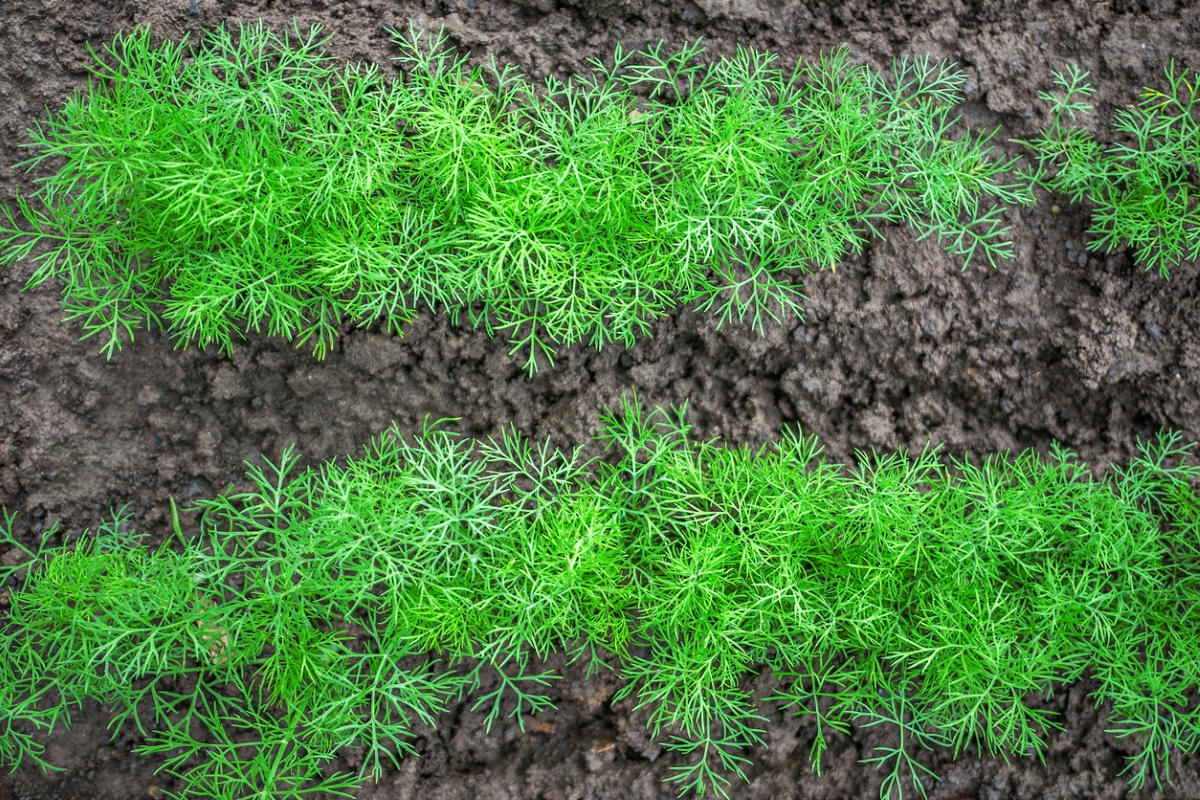
Dill is a top companion plant for many veggies, but it’s also one of the best companion plants for squash—including zucchini. Not only is dill easy to slip in between larger veggie plants, but its flowers are also highly attractive to predatory insects, like parasitic wasps, ladybugs, lacewings, and hoverflies.
Best For: Attracting hoverflies and other predatory insects.
Our Recommendation: Get Hera Dill at Burpee for $6.45 (400 organic seeds)
Blue Hubbard Squash (Cucurbita maxima var. Hubbard)
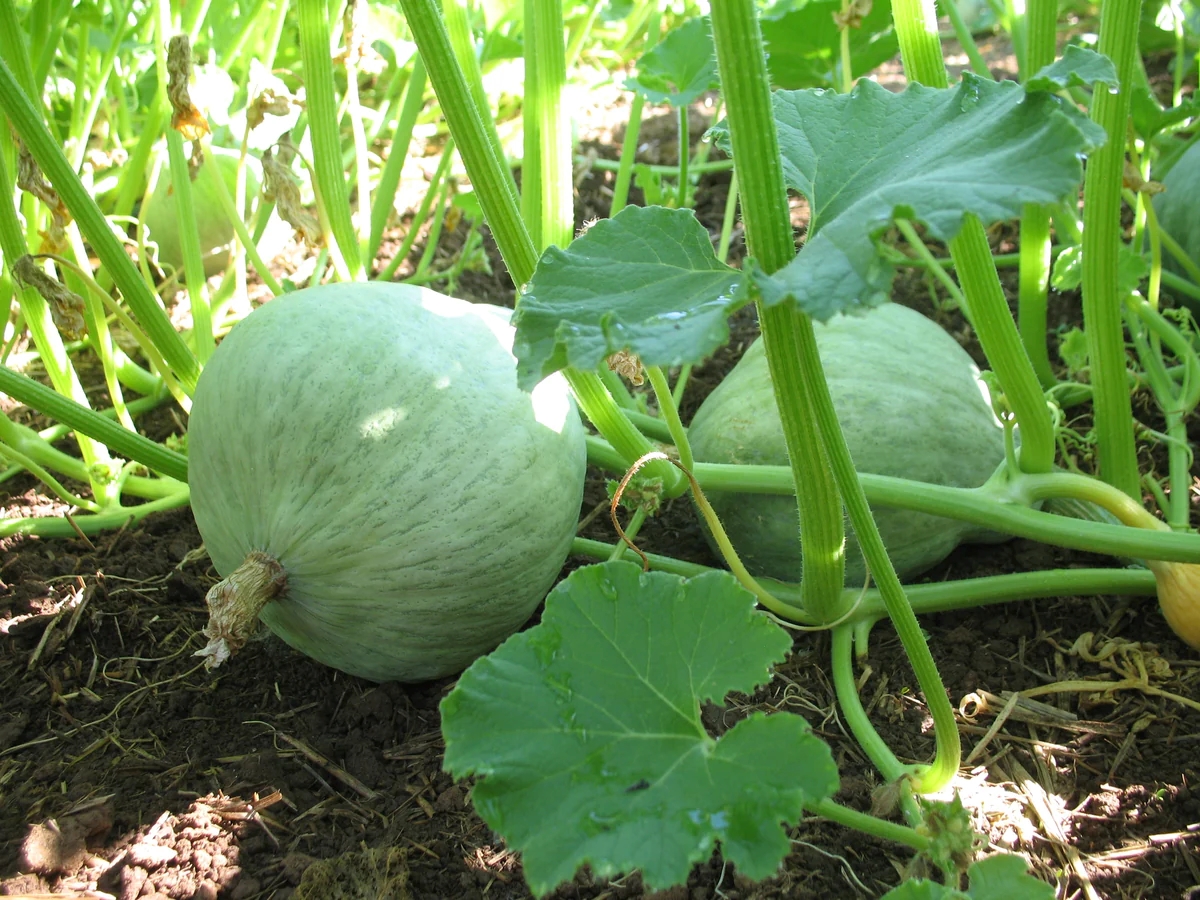
Although Hubbard squash is edible, many gardeners grow this plant simply as a trap crop for squash bugs and squash vine borers. Pests often prefer Hubbard squash to other squash plants and flock to these plant decoys, making pest control a bit easier.
Best For: Trap cropping for squash vine borers and squash bugs.
Our Recommendation: Get Blue Hubbard squash at Baker Creek Heirloom Seeds for $3 (20 seeds)
Borage (Borago officinalis)
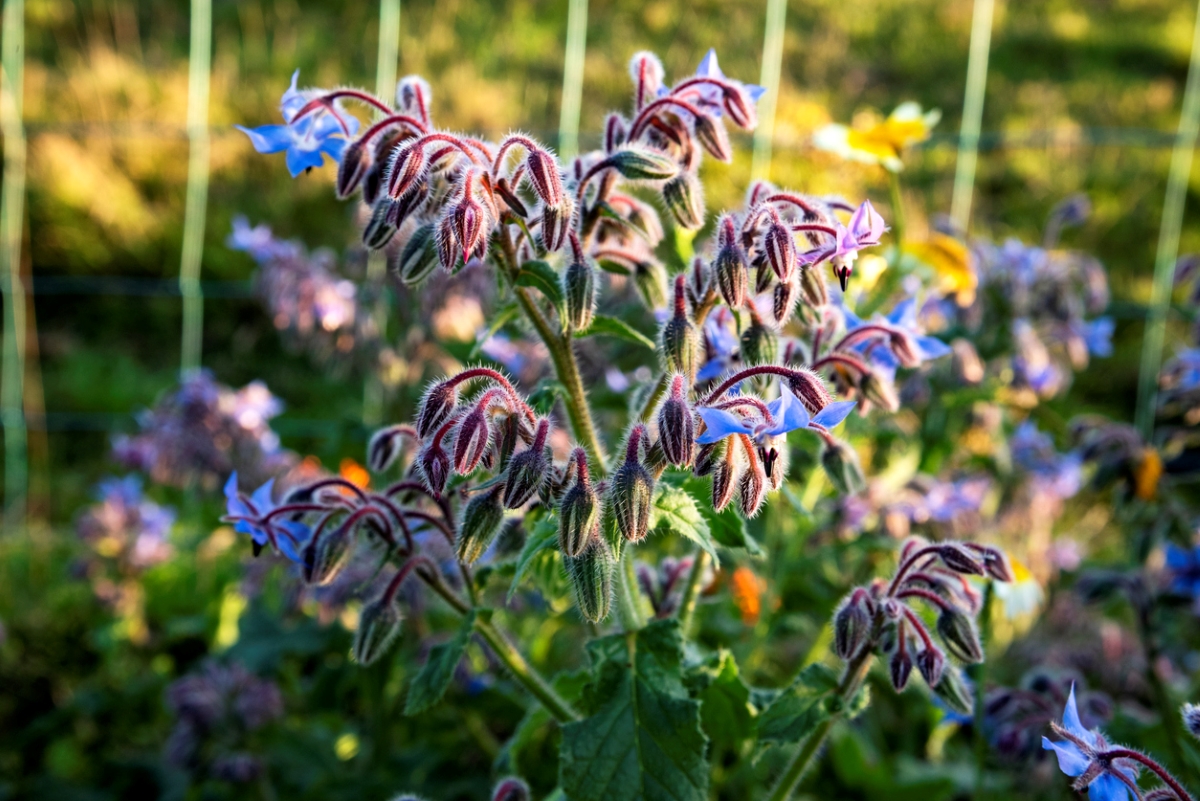
Borage can be grown for its edible leaves and flowers, which taste a bit like cucumber. But this powerhouse plant can also boost disease resistance in neighboring veggies, and attract pollinators and predatory wasps.
Best For: Attracting predatory wasps and pollinators.
Our Recommendation: Get borage at Burpee for $5.95 (200 seeds)
Sweet alyssum (Lobularia maritima)

One of Goossen’s personal favorite picks for zucchini or courgette companion planting, “alyssum flowers profusely throughout the season and supports many beneficial insects like hoverflies and parasitic wasps,” he says.
Best For: Attracting predatory insects like parasitic wasps.
Our Recommendation: Get Royal Carpet sweet alyssum seeds at Amazon for $4.49
Marigolds (Tagetes spp.)
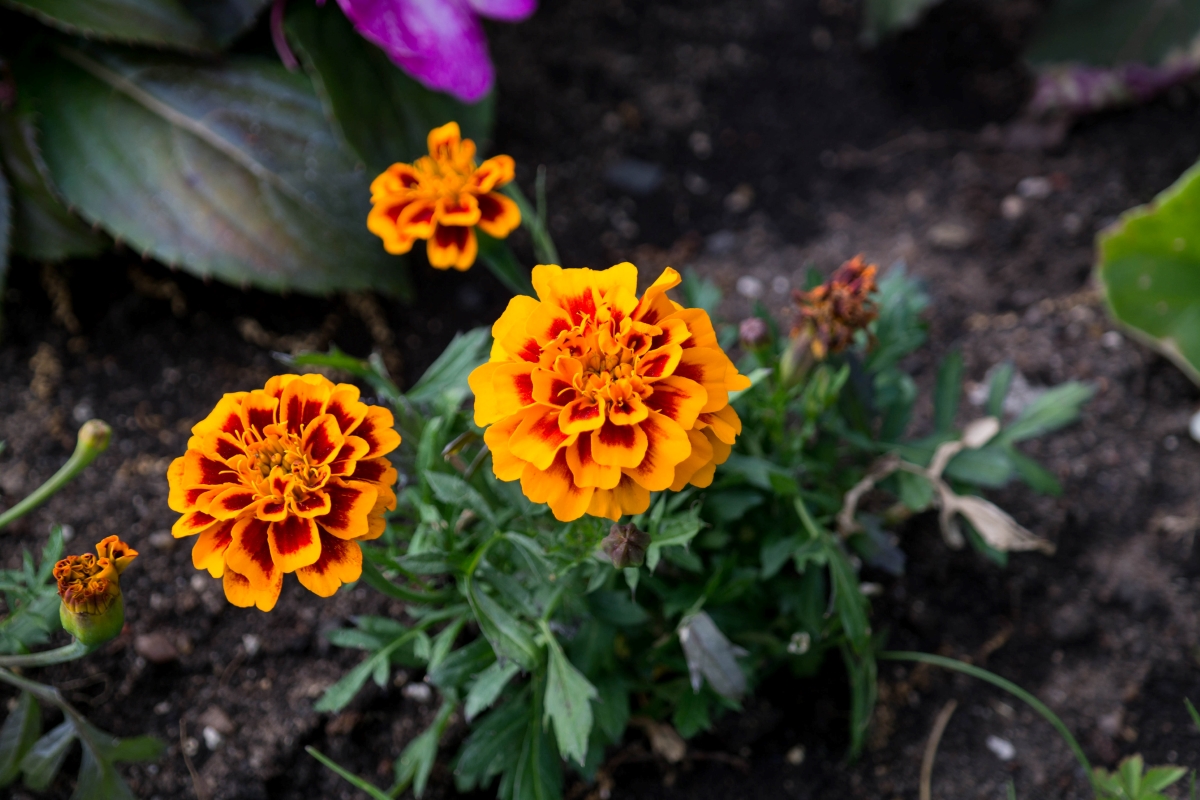
Marigolds are famous allies in the battle against garden pests and their scent is known to repel both deer and rabbits. Beneficial insects also flock to marigold flowers when they’re in bloom.
Best For: Repelling deer, rabbits, and other pests.
Our Recommendation: Get Queen Sophia marigolds at Burpee for $4.95 (100 seeds)
Companions That Improve Soil Structure, Nutrients, Flavor
When you’re considering what to plant near zucchini, companion planting for pest management is just one option. You can also find companion plants to improve soil structure and health, suppress weeds, and increase zucchini yields naturally.
Beans (Phaseolus vulgaris)
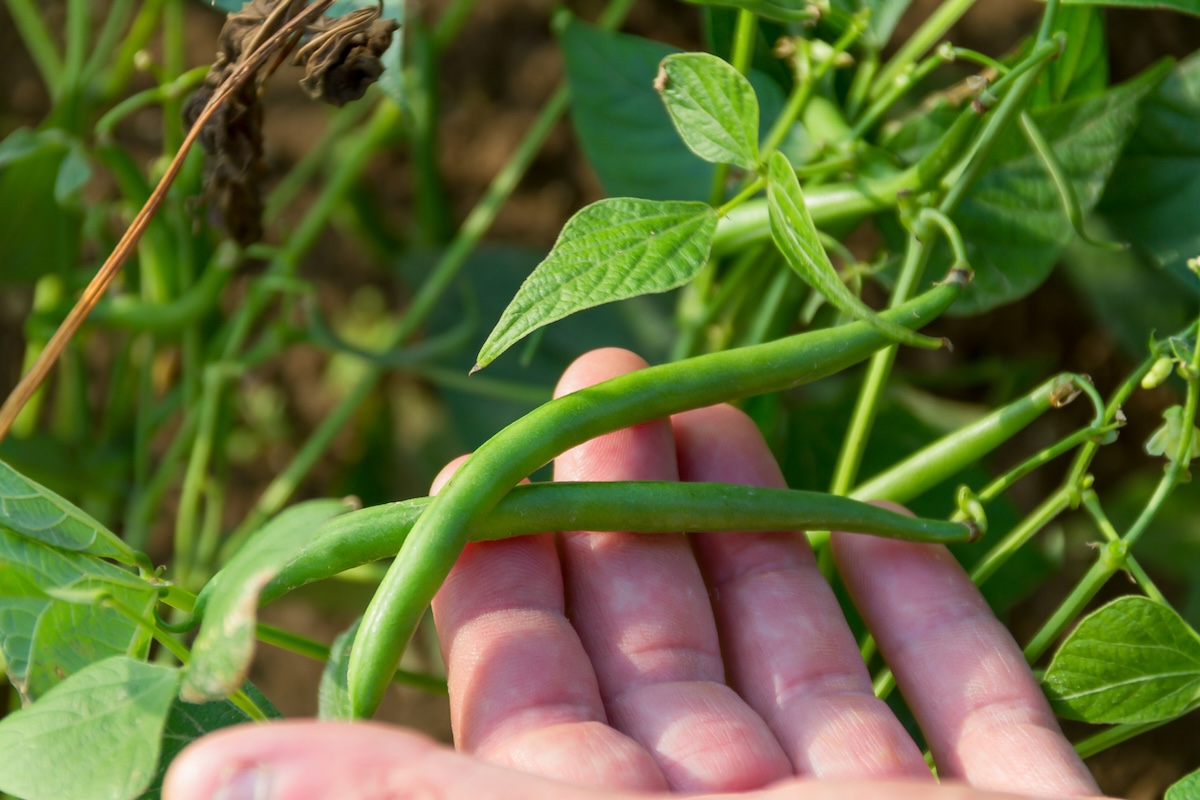
Beans add nutrients to the soil with their nitrogen-fixing roots, which can in turn enhance the growth of neighboring zucchini. But if you want a large zucchini harvest, it’s still a good idea to apply organic fertilizer around your zucchinis at 2- to 4-week intervals.
Best For: Adding nutrients to the soil.
Our Recommendation: Get Blue Lake 274 heirloom bush beans at Burpee for $4.95 (2 oz. seeds)
Peas (Pisum sativum)
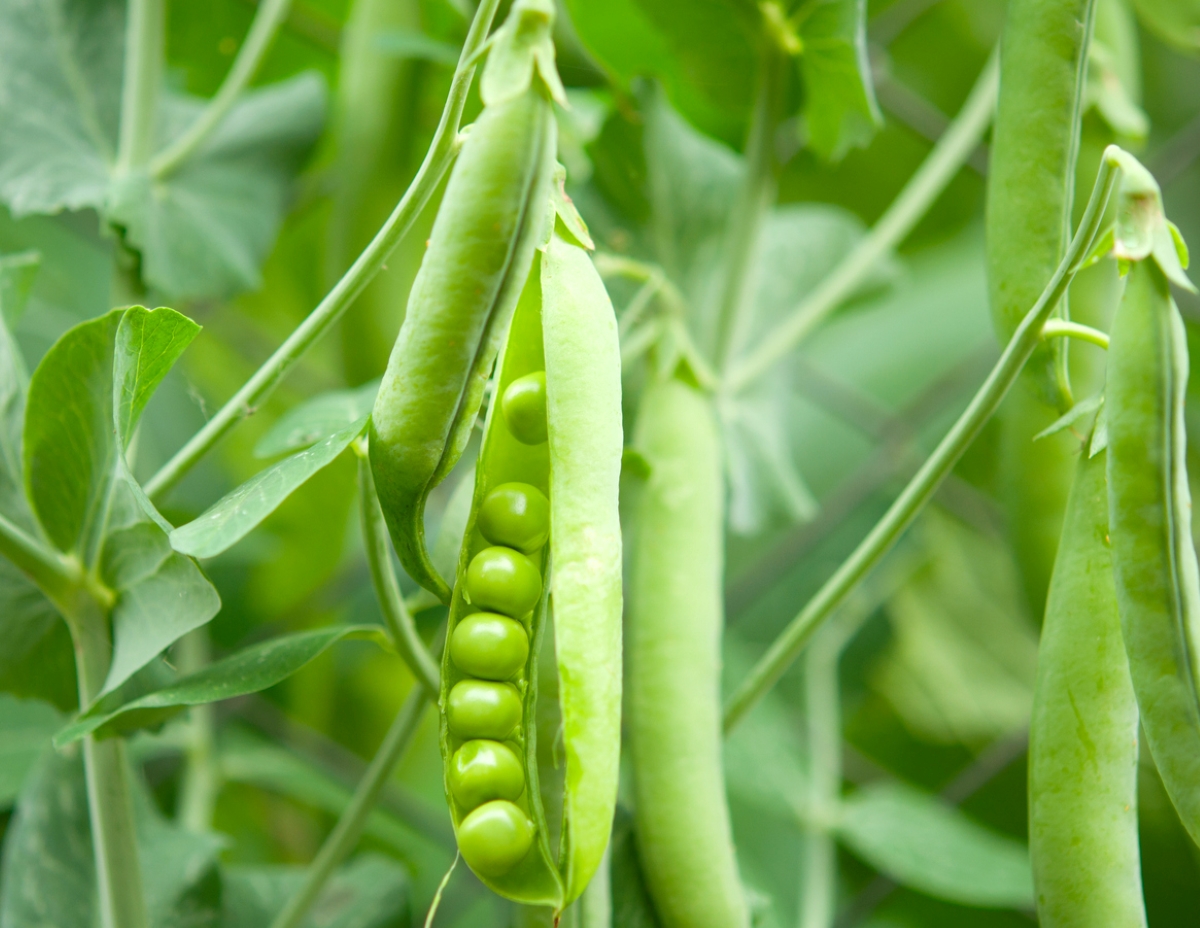
Like beans, peas add nitrogen to the soil, which can help zucchini grow. Peas grow best in cool weather, and can be succession planted with zucchinis for a continuous harvest of veggies.
Best For: Succession planting and soil improvement.
Our Recommendation: Get Blue Bantam Dwarf peas at Burpee for $4.95 (200 heirloom seeds)
Summer Savory (Satureja hortensis)
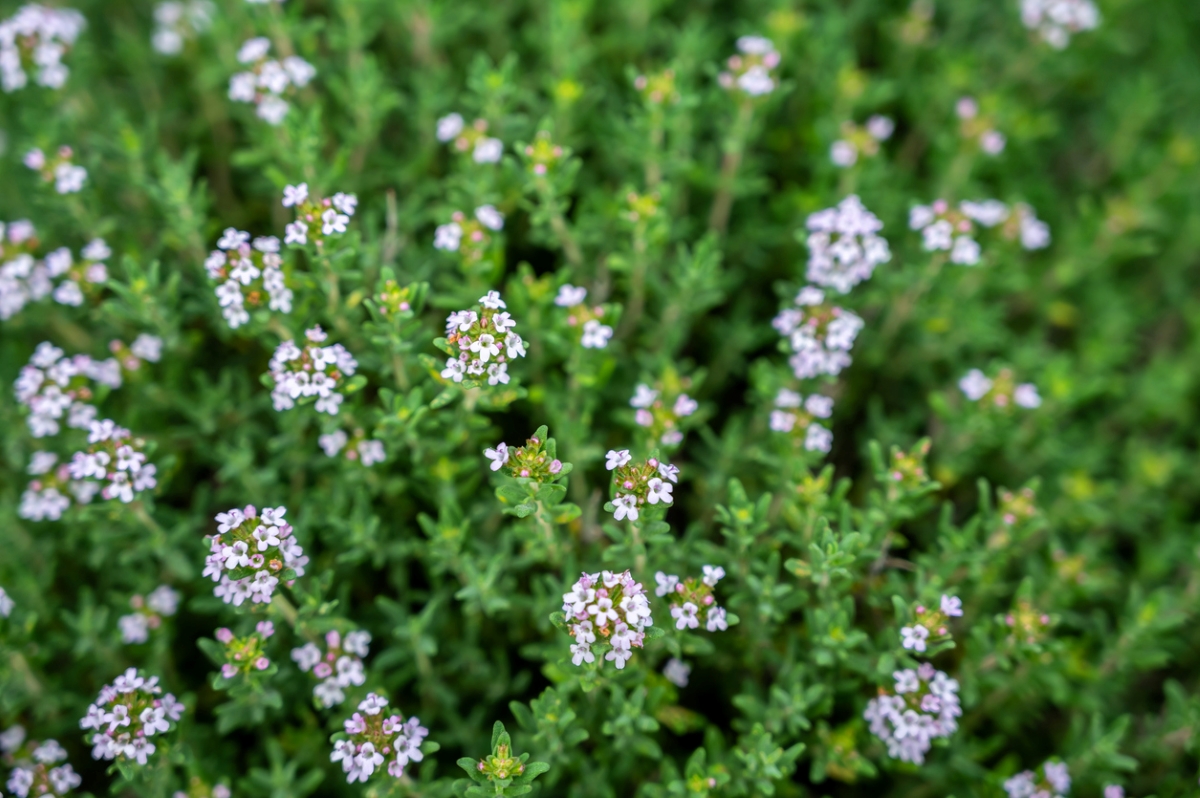
As a zucchini companion plant, summer savory has a lot of perks. This strongly scented herb repels an assortment of pests, but it can also improve the growth and flavor of neighboring veggies.
Best For: Improving zucchini growth and flavor.
Our Recommendation: Get summer savory seeds at Amazon for $4.85
Nasturtium (Tropaeolum spp.)
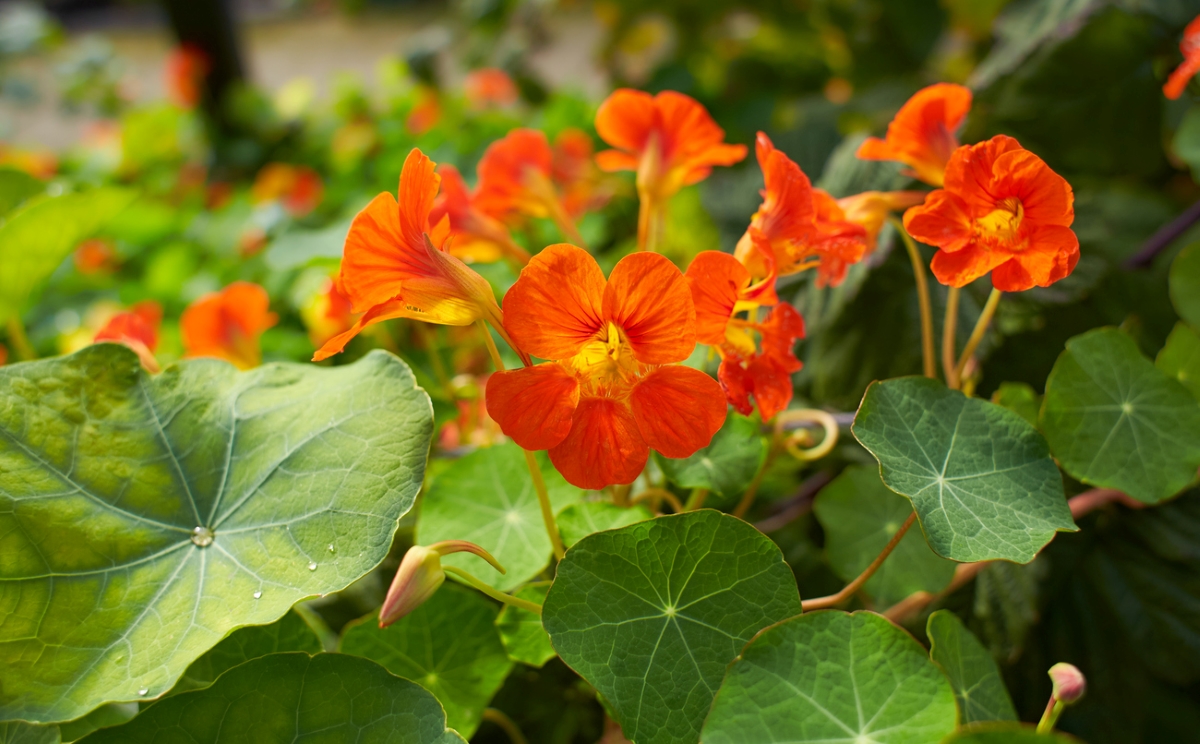
If you want to grow squash or zucchini and produce a large harvest, it’s always a good idea to consider pollinators. Squash-type plants don’t fruit well without insect activity, but nasturtiums can lure pollinators and other beneficial insects in. Plus, their spreading leaves can be used as a living mulch for reducing weeds.
Best For: Reducing weeds and attracting pollinators.
Our Recommendation: Get Double Dwarf Jewel Mix Nasturtiums at Burpee for $4.95 (50 heirloom seeds)
Chamomile (Matricaria chamomilla or Chamaemelum nobile)
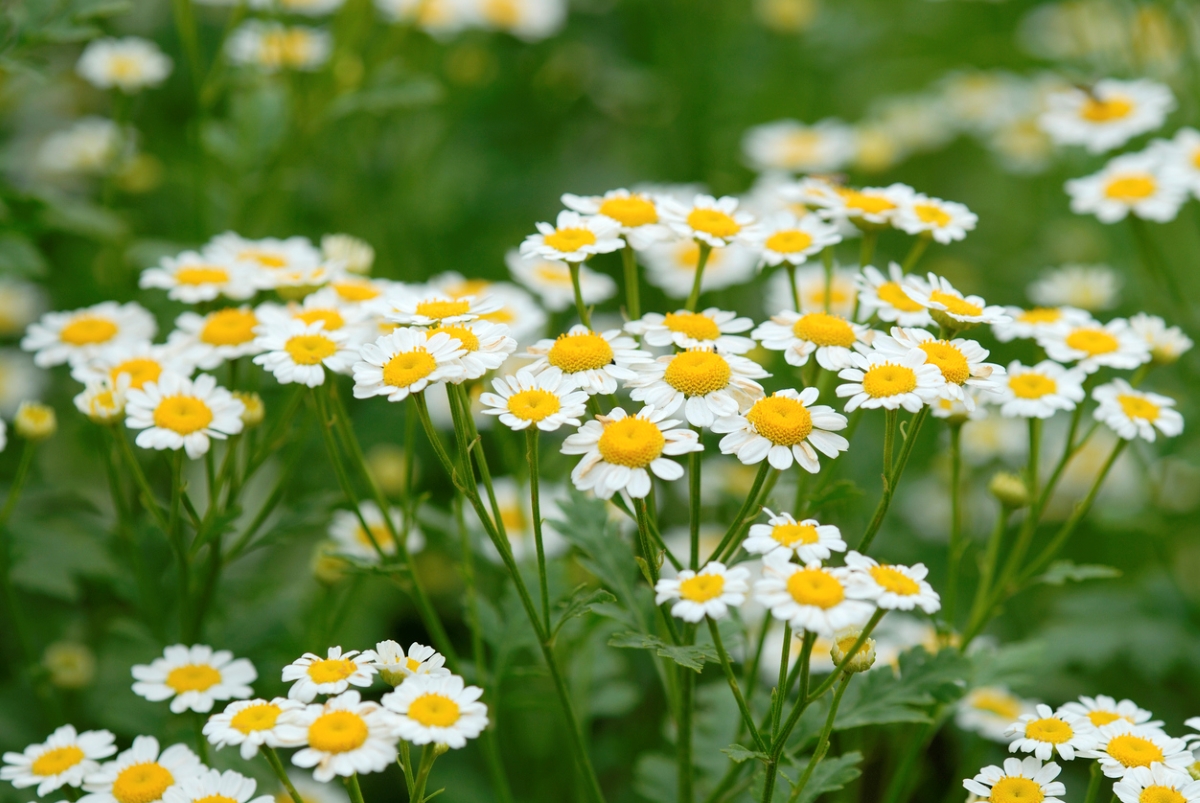
Chamomile’s flowers attract beneficial insects and pollinators, but this multipurpose plant also has antifungal and antibacterial properties that may help neighboring plants grow better.
Best For: General plant health.
Our Recommendation: Get German Chamomile at Burpee for $4.45 (2000 seeds)
Plants for Space, Conditions, Growth Habit
Some growers plant zucchini in rows, while others train their plants to grow vertically on trellises for space savings. Regardless of what planting method you choose to use, it’s often best to pair zucchinis with companion plants that have different growth habits to keep your veggies from competing with each other for soil space and light.
Sunflowers (Helianthus annuus)
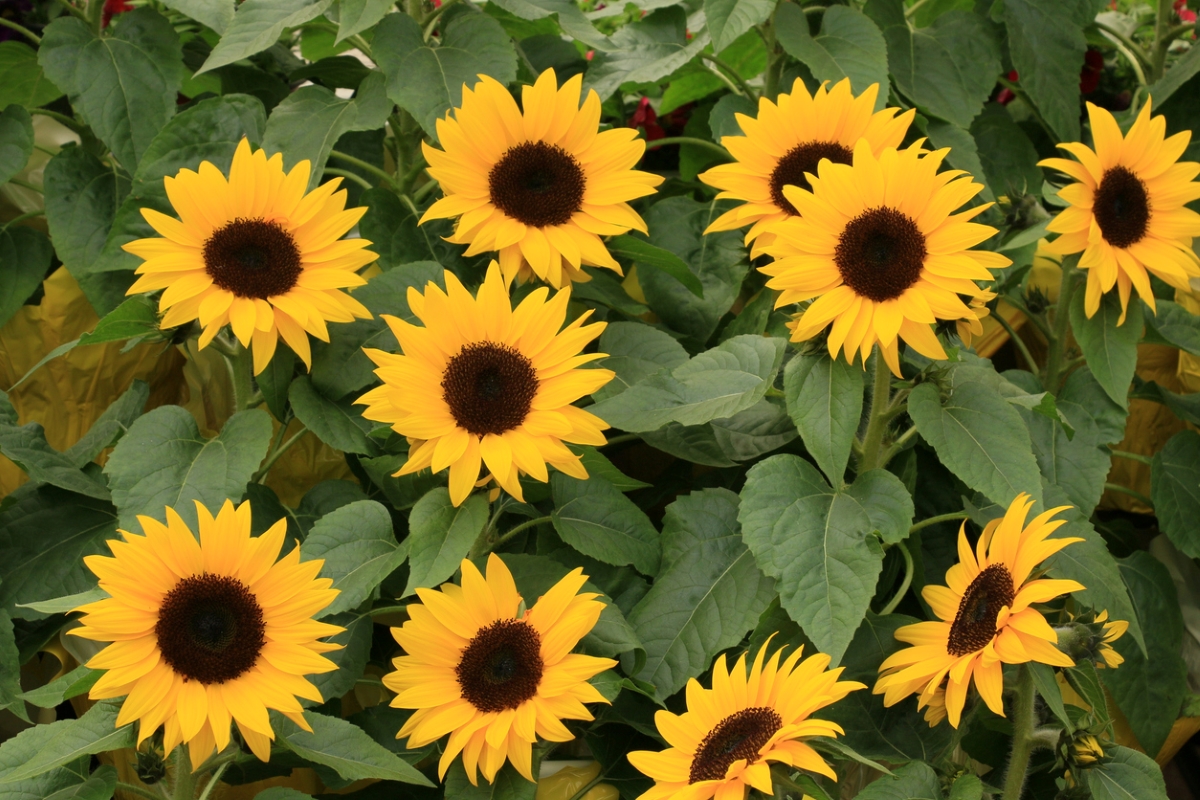
With their tall, straight stalks and sturdy roots, sunflowers make fantastic natural trellises for climbing plants, including zucchini. If you’re working with a small garden, you can also cultivate dwarf sunflowers to entice pollinators to visit your zucchini blooms.
Best For: Natural trellising and attracting pollinators.
Our Recommendation: Get Mammoth Sunflowers at Burpee for $4.95 (150 organic heirloom seeds). This variety can grow up to 12 feet high!
Radishes (Raphanus sativus)

Fast-growing radishes can be succession planted with zucchini or interplanted among zucchini plants to use up empty soil and boost your garden harvest.
Best For: Succession planting and filling in empty spaces.
Our Recommendation: Heirloom, high-yielding Early Scarlet Globe radishes at Burpee for $4.95 (300 seeds)
Corn (Zea mays)

The Three Sisters gardening method is one of the oldest known examples of companion planting. In this companion plant pairing, corn, winter squash, and pole beans are grown together with corn serving as a natural trellis for vining beans and the squash leaves acting as a natural mulch for weed suppression. But you can swap winter squash for zucchini, and grow your own variation of the Three Sisters in your veggie patch.
Best For: Natural trellising.
Our Recommendation: We love heirloom seed varieties like Golden Bantam, which you can save for planting next year. Get Golden Bantam corn from Burpee for $5.95 (95 organic seeds)
Lettuce (Lactuca sativa)
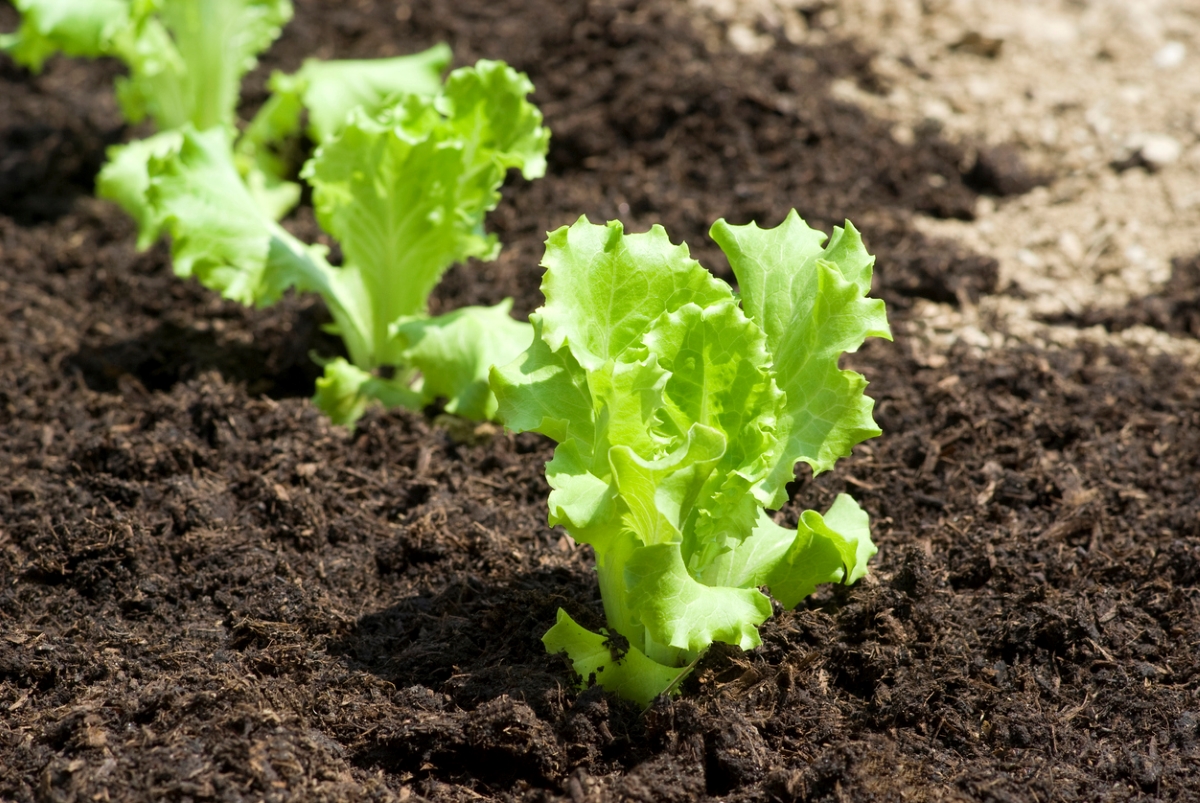
Like radishes, lettuce is a small plant that can be easily interplanted among larger zucchinis, or succession planted before and after your main zucchini crop.
Best For: Succession planting and filling in empty spaces.
Our Recommendation: Get buttercrunch lettuce seeds at Burpee for $5.95 (500 seeds)
Garlic (Allium sativum)
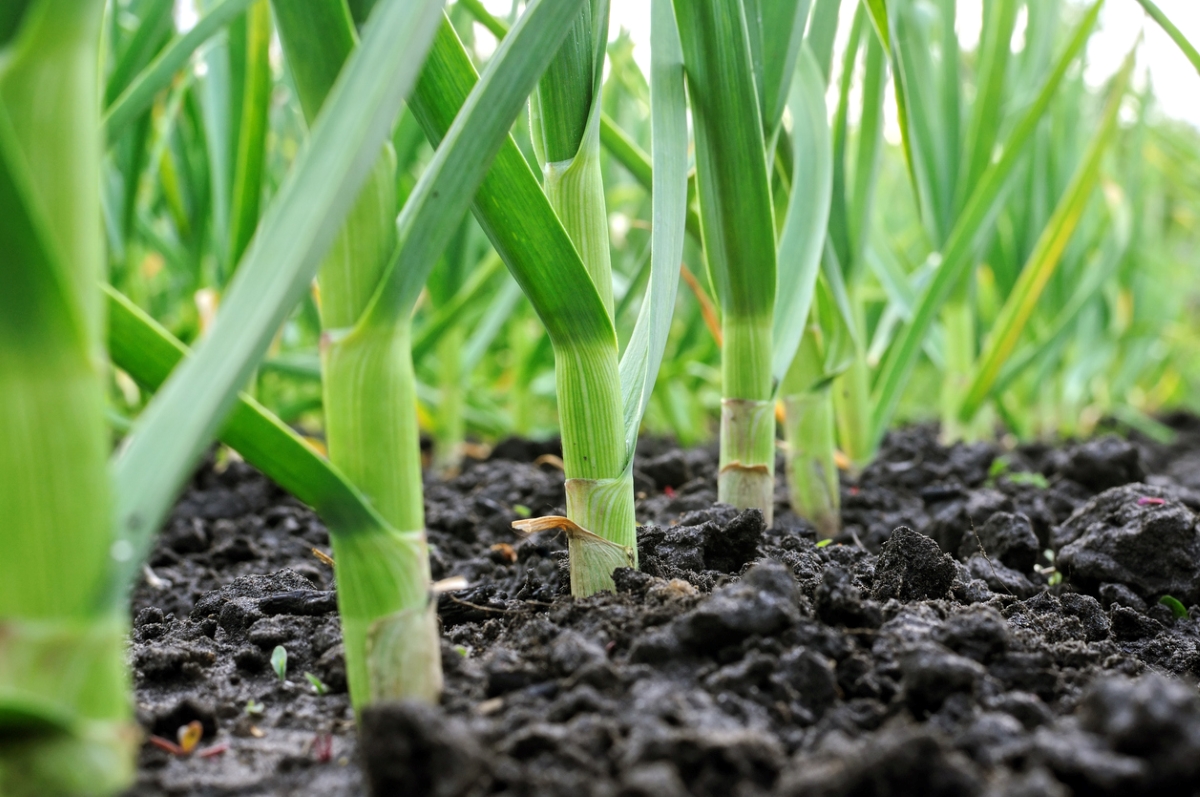
Garlic is often harvested before zucchini plants get large, which means these crops can be grown in succession in mixed beds. But you can also cultivate zucchini and garlic together to take advantage of garlic’s pest-repelling properties.
Best For: Succession planting and pest management.
Our Recommendation: Get seed garlic at Burpee; price varies by variety
5 Plants Never to Grow Near Zucchini
Most common vegetables get along with zucchini plants, but some plants can attract pests or compete with zucchinis and reduce yields. Avoid making a companion planting mistake by keeping these antagonistic plants far from your zucchinis!
- Other cucurbits: Squash, melons, pumpkins, and cucumbers are closely related to zucchini and they have very similar growing needs. Unfortunately, these plants are vulnerable to the same pests, so it’s best to separate them in the garden.
- Potatoes: Growing heavy-feeding potatoes can compete with zucchini for soil nutrients and reduce harvest yields. Plus, these two plants attract some of the same pests.
- Jerusalem artichokes: Also known as sunchokes, Jerusalem artichokes grow quite aggressively and often outcompete smaller plants like zucchini.
- Sweet potatoes: Like standard potatoes, sweet potatoes can sap soil nutrients and make zucchini plants fruit less prolifically.
- Fennel: Fennel releases allelopathic compounds into the soil, which suppress the growth of neighboring plants. This helps fennel avoid competition from other crops, but it makes it a terrible companion plant.

